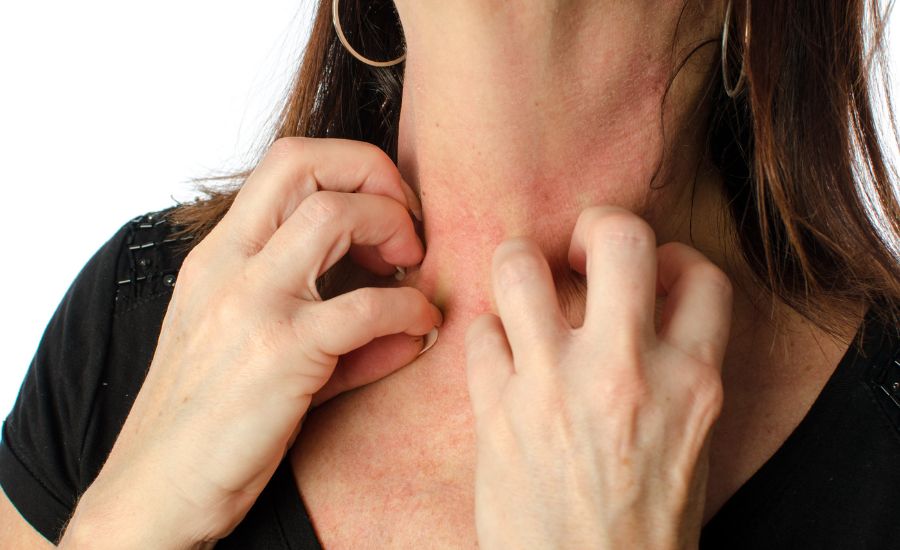A drug allergy occurs when your immune system reacts to a medicine. Drug allergy symptoms can be mild or life-threatening. Here are a few symptoms of drug allergies:
1. Swelling
Drug allergies cause angioedema, a reaction involving the swelling of the dermis. Angioedema is classified as acute, idiopathic, hereditary, vibratory, or acquired C1 inhibitor deficiency. Idiopathic angioedema causes swelling in the hands, legs, face, and arms. The acquired C1 inhibitor deficiency affects your voice box and can result in suffocation. With vibratory angioedema, swelling occurs due to repeated vibrations while jogging or riding a motorcycle. Your doctor provides corticosteroids to treat drug allergies that cause swelling beneath the skin.
2. Rashes
A drug allergy can trigger rashes. The symptoms of drug rashes include redness, itching, peeling, and pain. Doctors prescribe creams to prevent mild rashes from spreading. For severe reactions, they provide treatment with diphenhydramine or a corticosteroid. Corticosteroids work by penetrating the cell membrane and binding to skin receptors. This boosts the production of anti-inflammatory proteins to inhibit rash formation.
3. Hives
Drug reactions can trigger histamine release, leading to the formation of hives or welts. Hives appear on the skin as red or flesh-colored bumps that cause itching. Histamine release causes your skin to swell due to the widening of blood vessels. Welts form when you are exposed to a drug that causes sensitivity. Doctors classify hive breakouts as acute or chronic, depending on severity. They offer antihistamine prescriptions to reduce swelling and relieve itching.
4. Wheezing
Some drug allergies can tighten your lungs and throat, forcing the body to work harder during respiration. The forced breathing produces a high-pitched sound when you exhale. Allergic wheezing can be accompanied by a cough and a compression in the chest. Doctors assess the wheezing tone to identify which part of the respiratory system is narrowed or blocked. A narrowed upper respiratory system produces a hoarse wheeze. Your doctor provides medical guidance on drug withdrawal to treat wheezing.
5. Watery or Itchy Eyes
Allergic reactions to drugs may lead to watery eyes, also known as epiphora. Watery eyes are accompanied by cloudy vision, itchiness, and eye pain. Your eyes produce tears in large quantities or fail to drain tears away. Your doctor can diagnose you with unilateral or bilateral epiphora. They assess your symptoms to provide treatments for drug sensitivity.
6. Runny Nose
Your body may react poorly to certain drugs, resulting in a runny nose. Rhinorrhea is accompanied by nasal congestion, postnasal drip, and sneezing. With postnasal drip, excess mucus gathers and drips down the back of your throat. Doctors prescribe intranasal steroids, antibiotics, and decongestants to treat rhinorrhea. Decongestants shrink the nasal passages and help keep them dry.
7. Anaphylaxis
Drug sensitivity can cause your immune system to release chemicals that shock the body. Your blood pressure drops, and your airways narrow. Anaphylaxis is indicated by vomiting, nausea, and a rapid, weak pulse. Your doctor administers epinephrine to resolve anaphylaxis-related problems.
Learn More About Drug Allergies
Doctors provide drug allergy treatments and desensitization to reduce your body’s reactivity. They are also able to perform drug and allergy testing to prevent harmful reactions. Contact a reputable physician to learn more about their drug allergy treatments.
You Should Know: Shoulder Injuries and Their Treatment Options


